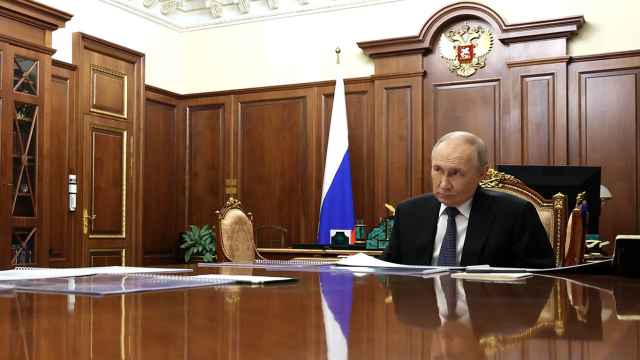Wireless provider Skartel, which operates under the Yota brand, hopes to get back the frequencies it was planning to use to build its fourth-generation network that were taken away by the government, without having to go to court.
Russian Technologies, which owns 25 percent of Skartel, is leveraging its general director, Sergei Chemezov, and his relationship with Prime Minister Vladimir Putin, to facilitate a resolution to the conflict.
Skartel asked the Moscow Arbitration Court to delay an initial hearing of its lawsuit against the Federal Communication, IT and Mass Media Inspection Service. The lawyer for the service agreed with the request, so the court rescheduled the hearing for Oct. 27.
The two sides are discussing how to resolve the disagreement amicably, a court spokesman said.
Inspection Service spokesman Mikhail Vorobyev said they are carefully studying a proposal of Skartel.
Skartel has a chance to resolve the dispute outside the courtroom, said company general director Denis Sverdlov.
The operator filed two claims against the inspection service on Aug. 26. The operator protested an order of the inspection service that took away frequencies in the range that can be used for 4G technologies WiMax and Long Term Evolution (LTE), which were received by the company between January and May 2010, for 170 Russian cities.
The inspection service explained that it had conducted an internal audit and found that those frequencies were granted in violation of an order dated Aug. 19, 2009, by the State Committee for Radio Frequencies that forbade the issuing of frequencies in that range. Skartel insists that the inspection service violated procedures in taking away the frequencies.
A senior executive at one of the major mobile operators told The Moscow Times that Skartel got the licenses under the pretext of providing data services using WiMax technology but intends to use them with LTE, which is the 4G technology that all the major mobile operators want to use. He said the situation highlights the fact that the industry is desperate for some formal policy from the ministry about next-generation mobile technology standards and how frequencies will be distributed, but up till now nothing has been clarified.
Negotiations for an out-of-court settlement are the result of Chemezov’s intervention, confirmed sources close to Skartel and the State Committee for Radio Frequencies. In August, when the inspection service issued the order to take back the frequencies, Chemezov was on vacation. But in the first half of September, he met jointly with Putin and Communications and Press Minister Igor Shchyogolev, and then with President Dmitry Medvedev. At both meetings the problem of Skartel’s frequencies was discussed, a source told Vedomosti.
On Sept. 10, Putin told Shchyogolev to settle the matter, the source said.
Putin’s spokesman Dmitry Peskov confirmed that the confiscation of frequencies from Skartel was discussed and Putin tasked the minister with finding a resolution. A source told Vedomosti that Russian Technologies hopes the frequency issue will be solved in the first half of October. Sources close to the Communications Ministry say Shchyogolev discussed the situation with Chemezov, who promised that Skartel would drop the lawsuits.
But it may be easier to resolve the situation politically than it will be bureaucratically or practically. The inspection service cannot cancel the confiscation order, or it will be in violation of the earlier order of the State Committee for Radio Frequencies. The question could be decided by the committee itself, said a source at the inspection service and another source close to the committee. The agenda for the next meeting of the committee will be set next week, the source said. But the mobile operators are expecting to see on that same agenda the issue of how 4G frequencies will be distributed overall.
(Vedomosti, MT)
A Message from The Moscow Times:
Dear readers,
We are facing unprecedented challenges. Russia's Prosecutor General's Office has designated The Moscow Times as an "undesirable" organization, criminalizing our work and putting our staff at risk of prosecution. This follows our earlier unjust labeling as a "foreign agent."
These actions are direct attempts to silence independent journalism in Russia. The authorities claim our work "discredits the decisions of the Russian leadership." We see things differently: we strive to provide accurate, unbiased reporting on Russia.
We, the journalists of The Moscow Times, refuse to be silenced. But to continue our work, we need your help.
Your support, no matter how small, makes a world of difference. If you can, please support us monthly starting from just $2. It's quick to set up, and every contribution makes a significant impact.
By supporting The Moscow Times, you're defending open, independent journalism in the face of repression. Thank you for standing with us.
Remind me later.





